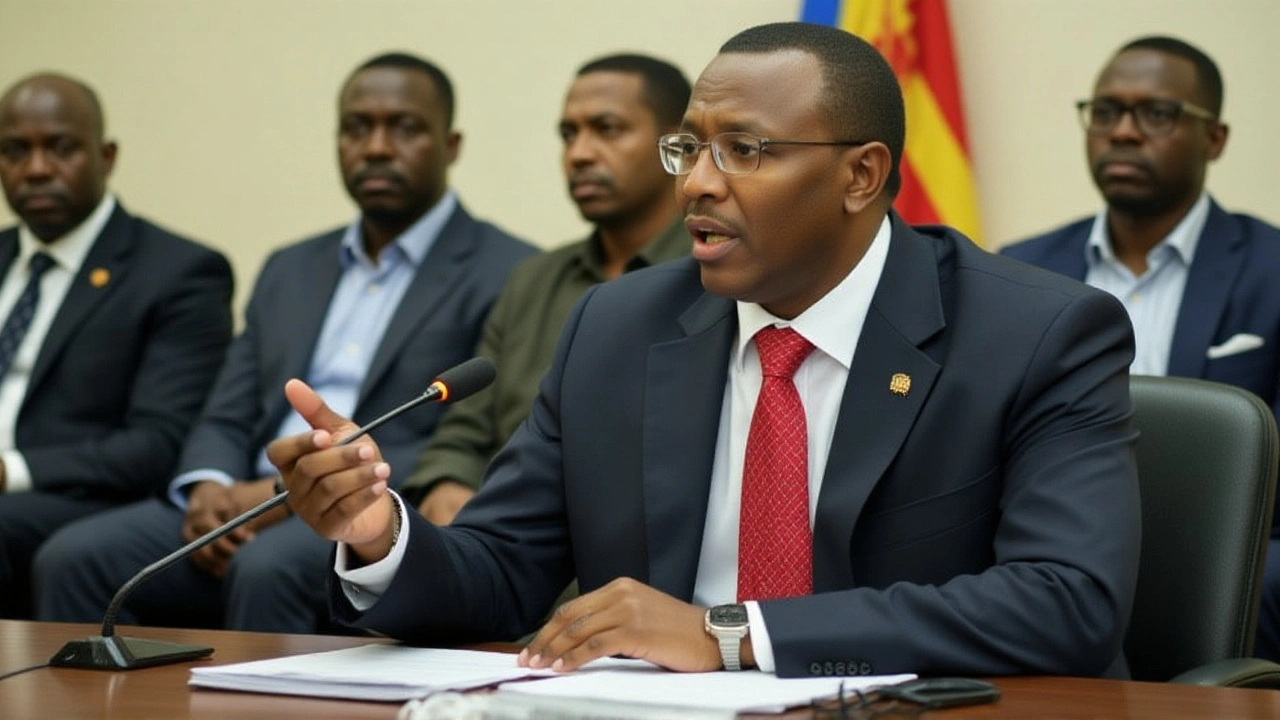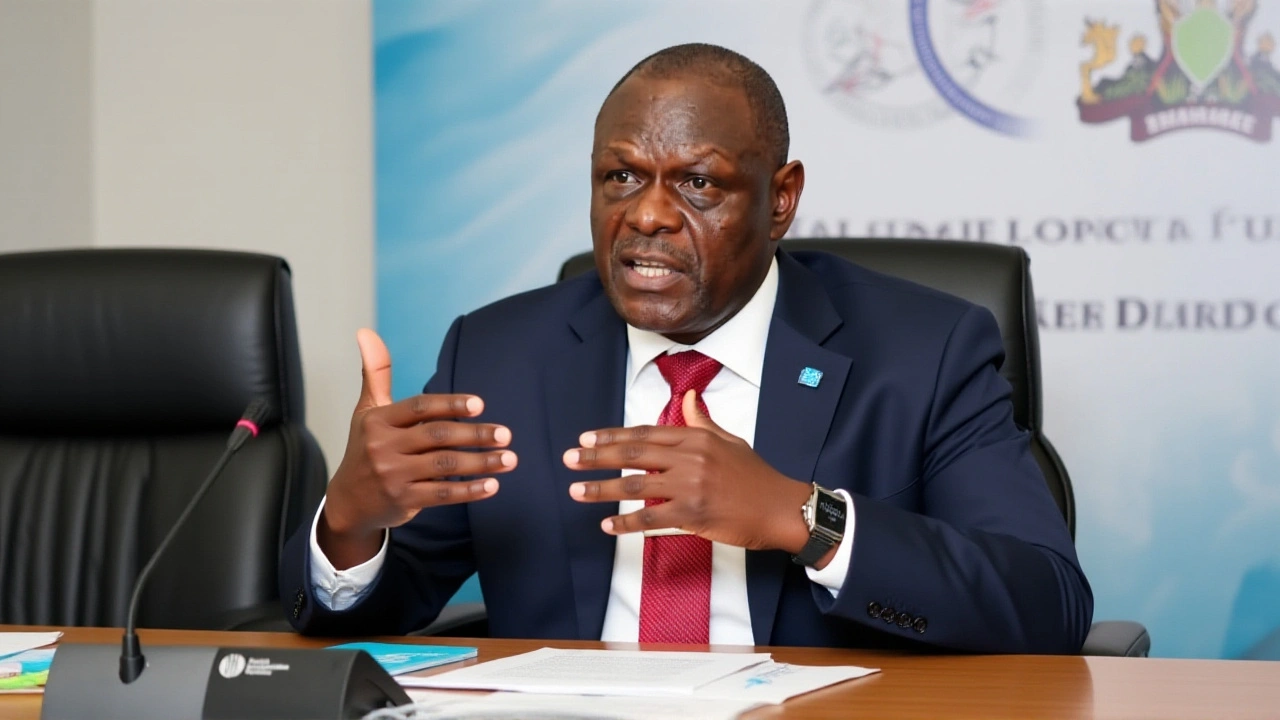When Alfred Indimuli Kahi, the 62‑year‑old former National Chairman of the Kenya Secondary School Heads Association (KESSHA), stepped before the selection panel on 12 May 2025, the room buzzed with a mix of curiosity and cautious optimism. He was one of six hopefuls vying for a coveted IEBC membership, a role that could shape Kenya’s electoral future for years to come.
Why the IEBC Chairmanship Matters Now
The Independent Electoral and Boundaries Commission, formally Independent Electoral and Boundaries Commission, is at the heart of Kenya’s democratic process. After a series of contested polls and public outcry over perceived lapses, the commission has been under pressure to restore credibility. The current reshuffle, announced by President William Ruto last month, aims to inject fresh expertise into the body before the 2027 general elections.
The Selection Process: A Crash Course
Yesterday’s interview was part of a three‑stage vetting exercise overseen by a panel chaired by Dr. Nelson Makanda, a seasoned public‑service administrator. The panel, comprising six senior officials, asked each candidate to outline a concrete plan for improving transparency, efficiency, and public trust.
- Alfred Kahi – emphasized open communication channels and data‑driven decision‑making.
- Ahmed Sheikh – focused on digital voter registration upgrades.
- Alamitu Guyo – advocated for stronger regional monitoring teams.
- Albert Nguma – proposed a citizen‑oversight board.
- Ali Nur – suggested a zero‑tolerance policy for electoral fraud.
- Ann Nderitu – championed gender‑balanced staffing.
Each candidate had 30 minutes to present a slide deck, answer probing questions, and respond to a mock crisis scenario designed to test crisis‑communication skills.
Alfred Kahi’s Pitch: Education Meets Governance
Kahi opened with a brief recount of his tenure at KESSHA, where he led a coalition of over 1,200 school principals and spearheaded a national curriculum overhaul in 2019. "Building trust requires **clear, unambiguous channels of communication**," he told the panel, quoting his own earlier speech at a Nairobi teachers’ conference.
He highlighted three pillars for the IEBC:
- Transparency: an online portal that publishes real‑time vote tallies and stakeholder reports.
- Accountability: a whistle‑blower framework protected by law.
- Engagement: community outreach programmes in every constituency, modelled on the school‑parent‑teacher meetings he popularised.
When asked how his background prepared him for the commission, Kahi reminded the panel of his Bachelor of Education from Kenyatta University (class of 1986) and a Diploma in Education Management from the Kenya Education Management Institute (KEMI) earned in 2013. He is currently chasing an MBA in Strategic Management at the University of Nairobi, a move he says reflects his belief in lifelong learning.
Reactions From Stakeholders
The education sector welcomed Kahi’s candidacy. Prof. Grace Mwangi, a former KESSHA board member, noted, "Alfred knows how to navigate bureaucratic inertia. If anyone can translate school‑level accountability into national electoral practice, it’s him."
Opposition parties, however, remained skeptical. A spokesperson for the Orange Democratic Movement (ODM) said, "We will watch closely. The IEBC must be insulated from any single‑track influence, whether from education or politics."
IEBC insiders, speaking on condition of anonymity, hinted that the panel is leaning toward candidates with strong digital‑innovation track records, a nod to the commission’s ambitious e‑voting roadmap unveiled in 2024.
Potential Impact If Kahi Is Selected
Should Kahi secure a seat, analysts predict a noticeable shift toward community‑centric electoral reforms. Dr. James Ochieng, a political scientist at Strathmore University, argues that Kahi’s experience with stakeholder consensus could help defuse post‑election disputes, which have historically flared in Kenya’s Rift Valley and Coast regions.
Moreover, his push for an open data portal aligns with the African Union’s “Digital Democracy” agenda, potentially attracting donor funding from the European Union and the United Kingdom for capacity‑building projects.

What Comes Next?
The selection panel will deliberate in secret for the next 48 hours before presenting a shortlist to President Ruto’s office. The final appointment is expected by the end of June, giving the IEBC a few months to integrate new members before the 2027 election cycle ramps up.
Meanwhile, the six candidates have pledged to respect the panel’s decision and continue serving Kenya in various capacities, whether within civil society, academia, or private‑sector advisory roles.
Background: The IEBC’s Recent Turbulence
In August 2022, the IEBC faced its biggest credibility test when delayed results from the gubernatorial race sparked street protests in Nairobi and Mombasa. A subsequent audit by the Auditor General uncovered inconsistencies in the transmission of results from 27 constituencies.
Since then, the commission has undertaken a series of reforms: a new voter‑verification algorithm in 2023, a partnership with the International IDEA for best‑practice audits, and a public‑consultation series that attracted over 10,000 comments. Yet, trust levels remain low— a Pew Research Center poll conducted in March 2025 showed only 38 % of Kenyans believed the IEBC was “mostly trustworthy.”
Key Facts
- Date of interview: 12 May 2025
- Candidates: Alfred Kahi, Ahmed Sheikh, Alamitu Guyo, Albert Nguma, Ali Nur, Ann Nderitu
- Panel chair: Dr. Nelson Makanda
- IEBC’s current trust rating: 38 % (Pew, 2025)
- Next appointment deadline: 30 June 2025
Frequently Asked Questions
What qualifications does Alfred Kahi bring to the IEBC?
Kahi holds a B.Ed. from Kenyatta University (1986), a Diploma in Education Management from KEMI (2013) and is pursuing an MBA in Strategic Management at the University of Nairobi. He also served as KESSHA National Chairman, overseeing a network of over 1,200 school leaders and implementing nationwide educational reforms.
Why is the IEBC looking to add new members now?
Following the disputed 2022 elections and a low public trust rating of 38 % (Pew, 2025), the commission is under pressure to refresh its leadership ahead of the 2027 polls. New members are expected to drive transparency, improve digital infrastructure, and restore confidence.
How might Kahi’s education‑sector experience translate to electoral management?
Kahi’s work with KESSHA involved stakeholder consensus building, data‑driven policy rollout, and transparent communication—skills directly relevant to managing a national election body. He proposes an online portal for real‑time results, mirroring the open‑access reporting used in school performance dashboards.
What are the biggest challenges the new IEBC members will face?
Key challenges include modernising voter‑registration technology, combating misinformation, and ensuring impartiality amid a polarized political climate. They must also meet the EU‑backed digital‑democracy standards while navigating budget constraints.
When will the final IEBC appointments be announced?
The selection panel is expected to submit its recommendations to the President’s office by 24 May 2025, with the official appointment slated for the end of June 2025, just in time for the next electoral cycle’s preparatory phase.

13 Responses
Alfred Kahi's pitch sounds like a rehashed school report, nothing groundbreaking.
Kahi’s education background could bring a fresh perspective to the IEBC. The idea of community outreach mirrors how schools engage parents, which could boost voter education. A transparent online portal is a solid step toward rebuilding trust. If he can pull off the digital side, Kenya might finally see smoother elections.
Honestly, I’m not convinced-maybe the whole selection is just a political theatre, you know? Kahi’s “open‑communication” spiel feels like a textbook exercise, not a real reform. Plus, the IEBC has been sinking for years; a school‑principal won’t fix that. Still, I’ll keep an eye, just in case they actually try something new. -but who knows??
Alfred Kahi’s track record in the education sector demonstrates a clear commitment to systematic improvement.
He managed to coordinate over a thousand school principals, a feat that required robust communication channels and consistent data collection.
Those same skills are directly transferable to the electoral arena, where transparency and timely information are paramount.
By proposing an online portal for real‑time vote tallies, Kahi mirrors the dashboards used in schools to monitor performance, allowing citizens to verify results as they happen.
His whistle‑blower framework would give protection to insiders, much like the anonymous feedback mechanisms that safeguard teachers from undue pressure.
Community outreach programmes in every constituency could draw on the parent‑teacher meeting model, fostering a culture of civic participation that starts at the grassroots.
Moreover, his ongoing MBA studies suggest a willingness to blend practical experience with modern strategic thinking, something the IEBC desperately needs.
The commission’s current trust rating of 38 % indicates a deep‑seated credibility gap that cannot be closed with superficial changes alone.
A leader who understands how to build consensus among diverse stakeholders can help bridge the divide between political parties and the voting public.
Kahi’s emphasis on data‑driven decision‑making aligns well with the digital‑democracy agenda promoted by the African Union and potential donor agencies.
Should he secure a seat, we might see a phased rollout of e‑voting tools, starting with pilot projects in regions that have historically experienced post‑election disputes.
His experience with curriculum overhaul shows he can navigate bureaucratic inertia and implement reforms even when faced with resistance.
Importantly, the education sector’s focus on equity could translate into more inclusive voter education campaigns, ensuring marginalized groups are not left behind.
We must also acknowledge that any single individual cannot overhaul a system alone, but a collaborative board can amplify his initiatives.
In that sense, Kahi’s proposal for an open data portal could become a shared resource for NGOs, media, and civil society to monitor elections.
Overall, his blend of practical leadership, academic pursuit, and community‑centric mindset makes him a promising candidate for the IEBC.
If Kahi thinks a few slides will magically fix the IEBC’s rot, he’s living in a fantasy world. 🙄 Ethical leadership demands more than buzzwords; it requires unwavering accountability. 🌟
Sure, let’s trust the same people who turned a school board into a political playground to run our elections-what could possibly go wrong? 😉
The whole KESSHA narrative is a red‑herring; the IEBC needs tech architects not former principals. Kahi’s three‑pillar model is basic governance 101 and lacks any real digital strategy. In a post‑pandemic environment, election bodies must adopt blockchain‑enabled verification, not community meetings. His MBA may add business jargon but it won’t solve the structural deficits.
While Lane’s points sound sharp, the reality is that community engagement remains a cornerstone for voter confidence, especially in regions with low literacy.
Let’s keep the debate civil; attacking ideas won’t help the IEBC any more than shouting at a classroom wall. Constructive criticism can push Kahi to refine his digital roadmap. I back any effort that moves transparency forward.
Kahi’s plan is definately not enough to fix the IEBC’s deep issues. Its like putting a band-aid on a broken bridge.
Honestly, I expected more substance from someone who has spent years in a bureaucratic union.
We must ask ourselves what moral responsibility looks like when public trust is at stake. A candidate who talks about transparency must also embody it, not just parade it. Philosophy aside, actions speak louder than slides. If Kahi fails to deliver, the electorate will justifiably lose faith.
It’s fascinating how you all reduce complex electoral reform to school‑board anecdotes; the truth lies in constitutional theory. Have you considered the impact of voter‑ID legislation on marginalized communities? I think a deeper dive into jurisprudence would serve the discussion better.